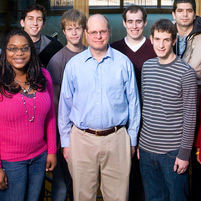Grand Challenge

Jonathan Cagan with ME students
For every Thomas Edison or Steve Jobs, a thousand innovators vanish into obscurity.
Thanks to Carnegie Mellon University Mechanical Engineering Professor Jonathan Cagan, a handful of creative student innovators are getting their moment in the sun.
In a new course, "Grand Challenge: Technology Identification and Product Design," CMU mechanical engineering students are charged with identifying future technologies and resulting products that could help solve some of the world's most daunting problems — from engineering better telemedicines to providing novel access to clean water.
Cagan said the course is based on 14 Grand Challenges issued to engineers nationwide by the National Academy of Engineering (NAE).
Those challenges span a variety of areas, including energy, medicine and the environment.
The NAE challenge was designed to pique engineering expertise in both academia and industry to solve myriad problems, from restoring aging infrastructures to developing better tools for scientific discovery.
"It would be hard to imagine where we would be today or how different our lives would be without the many recent innovations we often take for granted," said Cagan, co-author of "Built to Love: Creating Products that Captivate Customers." The book shows how product emotions correlate to market success.
Making technology accessible was a major driver for Steve Jobs. Take the iPod, for example. MP3 technology wasn't created just to deliver digital music to handheld players.
Instead, Jobs and Apple innovated a way to deliver the technology through an easy to use, contemporary physical device and service that augmented customers' lifestyles and revolutionized the way people listen to music.
"This new course helps students understand what it takes to develop truly cutting-edge products that deliver emerging technologies in a new way. It also gives them a taste of creating a product before consumers knew they needed it," said Bob Wooldridge, director of CMU's Center for Technology Transfer and Enterprise Creation (CTTEC).
CTTEC is part of the university's Greenlighting Startups initiative, a portfolio of CMU incubator groups designed to speed innovation from the research lab to the marketplace.
CMU is one of the fastest growing entrepreneurial universities in the U.S. Its students and faculty have created more than 300 companies and 9,000 jobs in the past 15 years.
Bryan Bleda, a mechanical engineering senior, said the new course will inspire him to be more discriminating in the design process. His team is researching better ways to package water filtration systems for drought-stricken sub-Saharan Africa.
"I will be working in designing the interior of commercial airplanes when I graduate. As a result of this class experience, I will be better able to sort through potential technologies and eliminate things that may sound good, but don't meet design criteria," said Bleda of McLean, Va.
Ph.D. student Noah Tovares had similar praise for the course. His team is studying how to make solar power more economical.
"My team is studying how to develop a complete energy management system that would permit each home to generate its own solar energy, and then store any excess energy throughout the neighborhood," said Tovares of Belmont, Mass.
"This new course really gave us fascinating insights into what is and what is not happening with solar cell research."
Cagan argues that the new course is essential to keep the U.S. from falling behind other nations in the strategic areas of science, engineering and math education.
Already, the World Economic Forum rated the U.S. 48th in the quality of its math and science prowess. And in 2009, 51 percent of the patents issued in the U.S. were to non-U.S. companies.
Related Links: Mechanical Engineering | Jonathan Cagan | Built to Love | CTTEC | Greenlighting Startups
